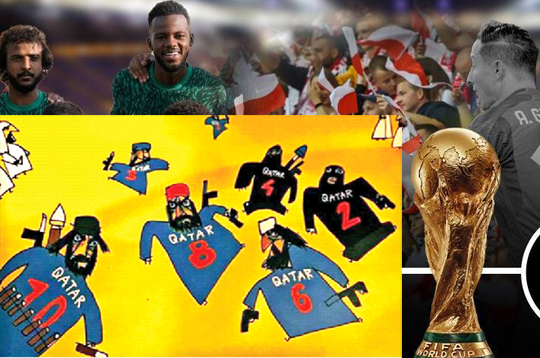“Qatar has been known to be a permissive environment for terror financing, reportedly funding U.S. designated foreign terrorist organisations, such as Hamas, as well as several extremist groups operating in Syria. ……In Qatar, there are three buckets: Terror financing by the government; terror financing done in Qatar through their own citizens that their government may not know about; and terror financing in Qatar that the government knows about but does nothing to stop.” — ASSESSING THE U.S.-QATAR RELATIONSHIP, HEARING BEFORE THE SUBCOMMITTEE ON THE MIDDLE EAST AND NORTH AFRICA OF THE COMMITTEE ON FOREIGN AFFAIRS, HOUSE OF REPRESENTATIVES, UNITED STATES, ONE HUNDRED FIFTEENTH CONGRESS, FIRST SESSION, JULY 26, 2017, Serial No. 115-55, JULY 26, 2017
The Football World Cup, organised under the banner of FIFA, is truly an international sporting extravaganza. After almost all countries of the world play in the qualifying rounds for around two years, thirty-two finally reach the final league round. Naturally, a lot of fun, entertainment and social activities occur around the sporting event. The tradition has been going on every four years since 1930, barring the turbulent period of World War II. Such a mega event involving billions of US dollars is bound to face controversies. But this year’s FIFA World Cup is facing the storm for all the wrong reasons: the Islamic overtones superseding the sports. It has also exposed the internal contradictions among the Islamists, who take a fundamentalist position on Islam. Since 2010, the World Cup in Qatar has been facing controversies. In an unprecedented move, the FIFA executive committee simultaneously declared the rights of the two tournaments, the 2018 and 2022 World Cups. The United States immediately demanded an investigation, and as per the US Justice Department, soccer officials also awarded television and marketing rights to enrich themselves.
Officials from Russia and Qatar also faced charges of bribing voting FIFA members to support their bids. Qatar is promoting Islam throughout the World Cup. Do Islamic values claimed by the kingdom allow this kind of conduct to host a sports tournament that is supposed to generate revenue worth USD 6.5 billion?
FIFA made an exception for Qatar to organise the World Cup outside the typical June-July window, considering the hot and humid climatic conditions. In return, the host country has imposed Islamic rules of not showing skin during the World Cup. Women are facing restrictions and discrimination. Even players are not allowed to remove their T-shirts, a common practice in a game of stamina like football. Why did Doha even bid for the event if the so-called Islamic culture was so critical? Not long back, the controversial Islamic preacher, facing charges of promoting Islamic terrorism and money laundering in Bharat, Zakir Naik, had declared ‘professional football to be Haram’ as per Islam. The same preacher will reportedly deliver his sermons to the fans on the sidelines of football.
Qatar has claimed that no official invitation has been extended to Naik for the event. As per the ground reports, the Islamist preacher is already in Doha. The Islamic kingdom has trained many people like him to organise Da’wah, a call to embrace Islam, as an integral part of the sporting festival. Al-Qaida, another outfit once supported and funded by the West Asian country, has called for a boycott of the World Cup. If there is so much confusion over professional football among Islamists, where is the need to grab the event through corrupt means? The human rights violations of the workers, blatant homophobia and inadequacy of infrastructure to host such a mammoth tournament are other controversies that have marred the game. The response of FIFA is meek and submissive to the money power. Keeping the political and human rights concerns is the general advice from the sporting body.
Qatar is known to be a permissive environment for terror financing, as the United States Congressional sub-committee has pointed out. On every minor issue, the kingdom stands up in the name of Ummah, cries of Islamophobia and promotes violent protests. Instead of killing the spirit of football and using the World Cup for Islamist propaganda, Qatar should resolve these contradictions first. It should also declare a resolve to utilise the amassed money through the World Cup for the Afghan and Syrian refugees fleeing due to the Islamists’ persecution.




















Comments